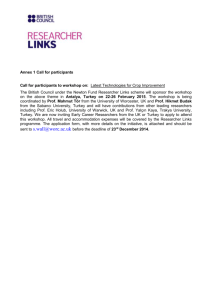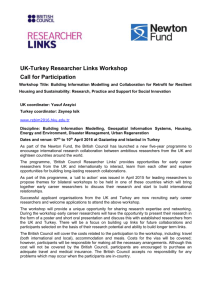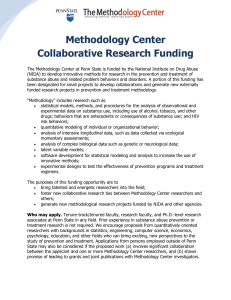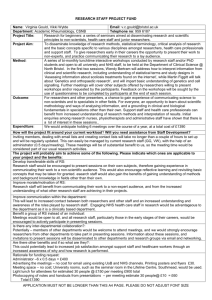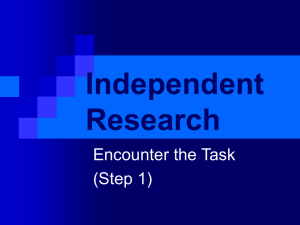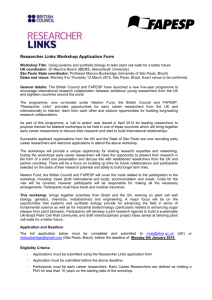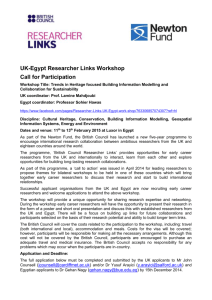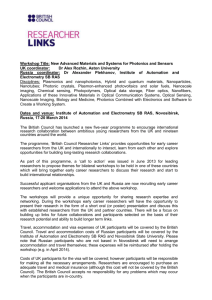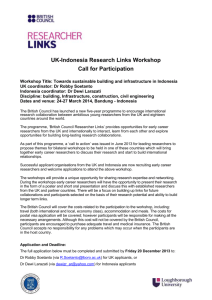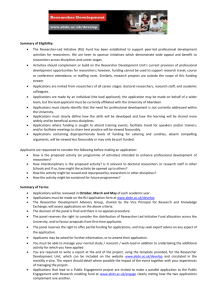Application form Latest Technologies for Crop
advertisement
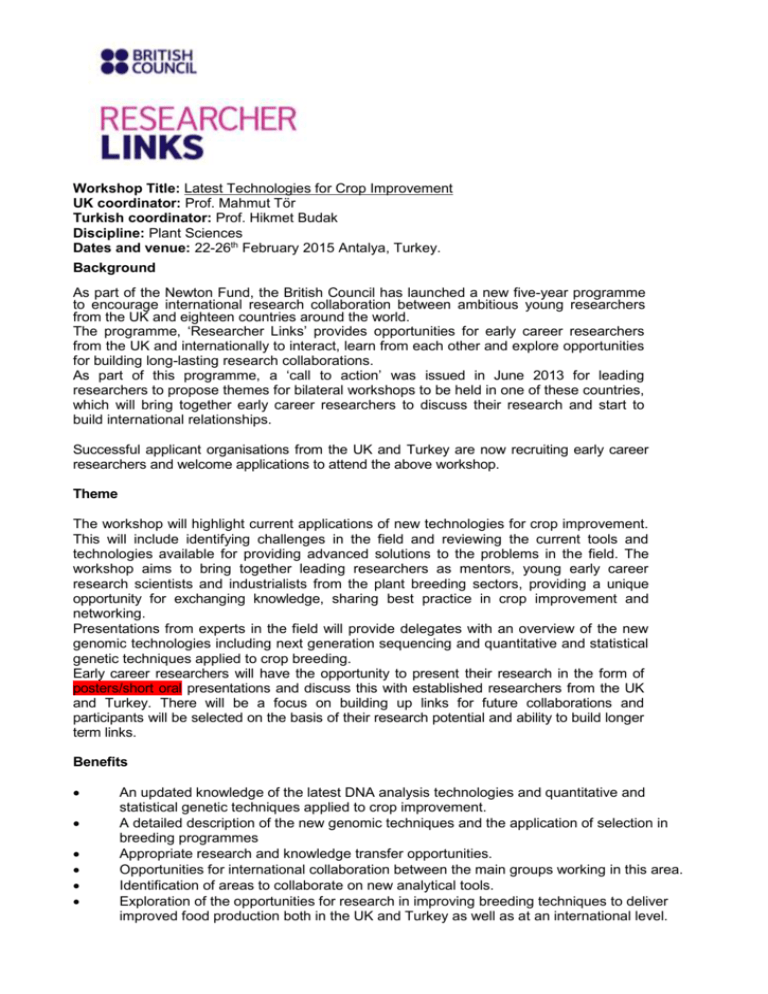
Workshop Title: Latest Technologies for Crop Improvement UK coordinator: Prof. Mahmut Tör Turkish coordinator: Prof. Hikmet Budak Discipline: Plant Sciences Dates and venue: 22-26th February 2015 Antalya, Turkey. Background As part of the Newton Fund, the British Council has launched a new five-year programme to encourage international research collaboration between ambitious young researchers from the UK and eighteen countries around the world. The programme, ‘Researcher Links’ provides opportunities for early career researchers from the UK and internationally to interact, learn from each other and explore opportunities for building long-lasting research collaborations. As part of this programme, a ‘call to action’ was issued in June 2013 for leading researchers to propose themes for bilateral workshops to be held in one of these countries, which will bring together early career researchers to discuss their research and start to build international relationships. Successful applicant organisations from the UK and Turkey are now recruiting early career researchers and welcome applications to attend the above workshop. Theme The workshop will highlight current applications of new technologies for crop improvement. This will include identifying challenges in the field and reviewing the current tools and technologies available for providing advanced solutions to the problems in the field. The workshop aims to bring together leading researchers as mentors, young early career research scientists and industrialists from the plant breeding sectors, providing a unique opportunity for exchanging knowledge, sharing best practice in crop improvement and networking. Presentations from experts in the field will provide delegates with an overview of the new genomic technologies including next generation sequencing and quantitative and statistical genetic techniques applied to crop breeding. Early career researchers will have the opportunity to present their research in the form of posters/short oral presentations and discuss this with established researchers from the UK and Turkey. There will be a focus on building up links for future collaborations and participants will be selected on the basis of their research potential and ability to build longer term links. Benefits An updated knowledge of the latest DNA analysis technologies and quantitative and statistical genetic techniques applied to crop improvement. A detailed description of the new genomic techniques and the application of selection in breeding programmes Appropriate research and knowledge transfer opportunities. Opportunities for international collaboration between the main groups working in this area. Identification of areas to collaborate on new analytical tools. Exploration of the opportunities for research in improving breeding techniques to deliver improved food production both in the UK and Turkey as well as at an international level. Transferring current knowledge in the field to the applied sector including nurseries and breeding companies. Funding The British Council, under the Newton Fund, will cover the costs related to the participation to the workshop, including: travel (both international and local), accommodation and meals. Costs for the visa will be covered; however participants will be responsible for making all the necessary arrangements. Although this cost will not be covered by the British Council, participants are encouraged to purchase an adequate travel and medical insurance. The British Council accepts no responsibility for any problems which may occur when the participants are in-country. Application and Deadline: The full application below must be completed and submitted by the 23rd December 2014 to s.wall@worc.ac.uk Eligibility Criteria: - Applications must be submitted using the Researcher Links application form - Application must be submitted before the above deadline - Participants must be early career researchers: Early Career Researchers are defined as holding a PhD (or having equivalent research experience in biological sciences, plant sciences, bioinformatics or related disciplines) and having up to 10 years post-PhD research experience. They are equivalent to the ‘Recognised Researcher’ and sometimes ‘Experienced Researcher’ categories in the EU framework for researchers’ careers. http://ec.europa.eu/euraxess/pdf/research_policies/Towards_a_European_Framework_for_ Research_Careers_final.pdf . - Participants must have a research or academic position (either a permanent post, research contract, or fellowship etc) at a recognised research institution either in the UK or in Turkey. Quality Assessment - Experience and relevance of the applicant’s research area to the workshop - Motivation and contribution to the aims of the workshop - Description of the long term impact expected through the participation in the workshop - Ability to disseminate workshop’s outcomes Selection Procedure: - Eligibility check - Quality assessment Notification of results: Successful applicants will be notified by email on the 6th January 2015. Equal Opportunities The British Council is committed to equal opportunities and diversity in all its activities and this includes the avoidance of any bias in the assessment of applications due to gender, disability, racial or ethnic origin, sexual orientation, or religious belief. Participants’ selection undertaken by workshop organisers must not contravene this policy. Extra support to enable participation of early career researchers with special needs will be given. Application Form 1. Applicant Name and title Gender (to monitor statistic participation – this will not be considered during assessment) Position and institution Postal address Email Phone number Brief CV (academic career, publications, markers of esteem, and any other relevant information) – no more than ½ page of A4 Abstract - Please give a summary of your area of research 3. Please describe your motivation to attend the workshop and how the workshop matches your professional development needs 4. Please describe the expected impact of your participation to the workshop on your personal and professional development, including your ability to work on an international level 5. Please indicate how you will disseminate the outcomes of the workshops and the new knowledge/skills you have acquired 6. Workshops will take place in English as standard. Please indicate your ability to work and communicate in English (Note, translators may be provided if necessary) Native speaker Good Excellent Need support 7. Please use this space to give any additional information that you feel is relevant for the application.
